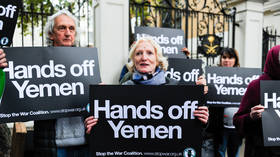Bipartisan bill aims to force votes on present & future US arms deals with Saudis

US Senators Chris Murphy (D-CT) and Todd Young (R-IN) have co-sponsored a bill to reign in President Donald Trump's power to sell arms to Saudi Arabia while sidestepping Congress, by forcing a vote on the deals.
The Republican and Democratic Senators plan to introduce a resolution that would potentially restrict the Trump administration's flourishing arms trade with, and security assistance to, Saudi Arabia, on Monday.
Also on rt.com Pompeo confirms $8.1bn arms sales to Arab nations without Congress approval to 'deter Iran'After lawmakers' unsuccessful previous attempts to stop American weapons from being funneled to Riyadh, the latest effort refers to a provision of the Foreign Assistance Act that allows Congress to vote to request information on the human rights record of a particular country. After being provided the data, Congress can vote to roll back any aspect of future or ongoing security assistance, including the supply of arms to that country.
The resolution is specifically aimed at forcing a vote on 22 arms deals struck between the US and the Saudis, as well as on any future weapons sales.
The motion was designed in response to Trump bypassing Congress last month to clear $8.1 billion in arms sales to the US' Arab allies, including Saudi Arabia, Jordan, and the United Arab Emirates. While foreign arms sales normally require congressional approval, Trump invoked a rarely-used emergency statute by citing the "threat" of Iran to ignore opposition from lawmakers. The senators were especially uneasy over the deals that will see US-made precision-guided munitions being supplied to the nations embroiled in the Yemen war. It has been reported that the deals also include transferring technology to build high-tech bomb parts in Saudi Arabia.
"The consequences are clear: the more weapons we sell to Saudi Arabia, the longer the war in Yemen drags on and the more civilians will die as a result of indiscriminate and disproportionate attacks by the Saudi-led coalition," Murphy stated in a press release, accusing the Trump administration of having "effectively given a blank check to the Saudis."
Criticism of the multi-billion-dollar deals with Riyadh has been on the rise in the US since the murder of Washington Post columnist Jamal Khashoggi in the Saudi Consulate in Istanbul in October, with lawmakers from both sides of the aisle calling on Trump to reassess cooperation with the Saudis and abandon his stalwart support of Crown Prince Mohammed bin Salman. Even before the journalist's brutal assassination, Murphy led the effort to block the arms sales to the kingdom as the civilian death toll in Yemen soared.
"I've argued from the beginning that there is a US imprint on every single civilian death inside Yemen. I don't think the Saudis would be conducting this level of atrocity if not for the support from the United States," he told the Intercept back in September.
The Saudi-led bombing campaign has killed over 10,000 people since March 2015, displacing hundreds of thousands in what was described by the UN as the "the world's worst humanitarian crisis."
Amid the initial outcry from Khashoggi's killing, several European nations suspended their arms sales to the kingdom, including Germany, Denmark, Norway, Sweden, Austria, and Greece. However, France and the UK, the second biggest Saudi arms supplier after the US, are still channeling weapons to Riyadh.
American weapon supplies have continued uninterrupted, despite documented evidence that US-made bombs were used in attacks on civilians. The debris of one such bomb was found on the site of an August 9 bombing of a school that killed 40 children.
Think your friends would be interested? Share this story!














